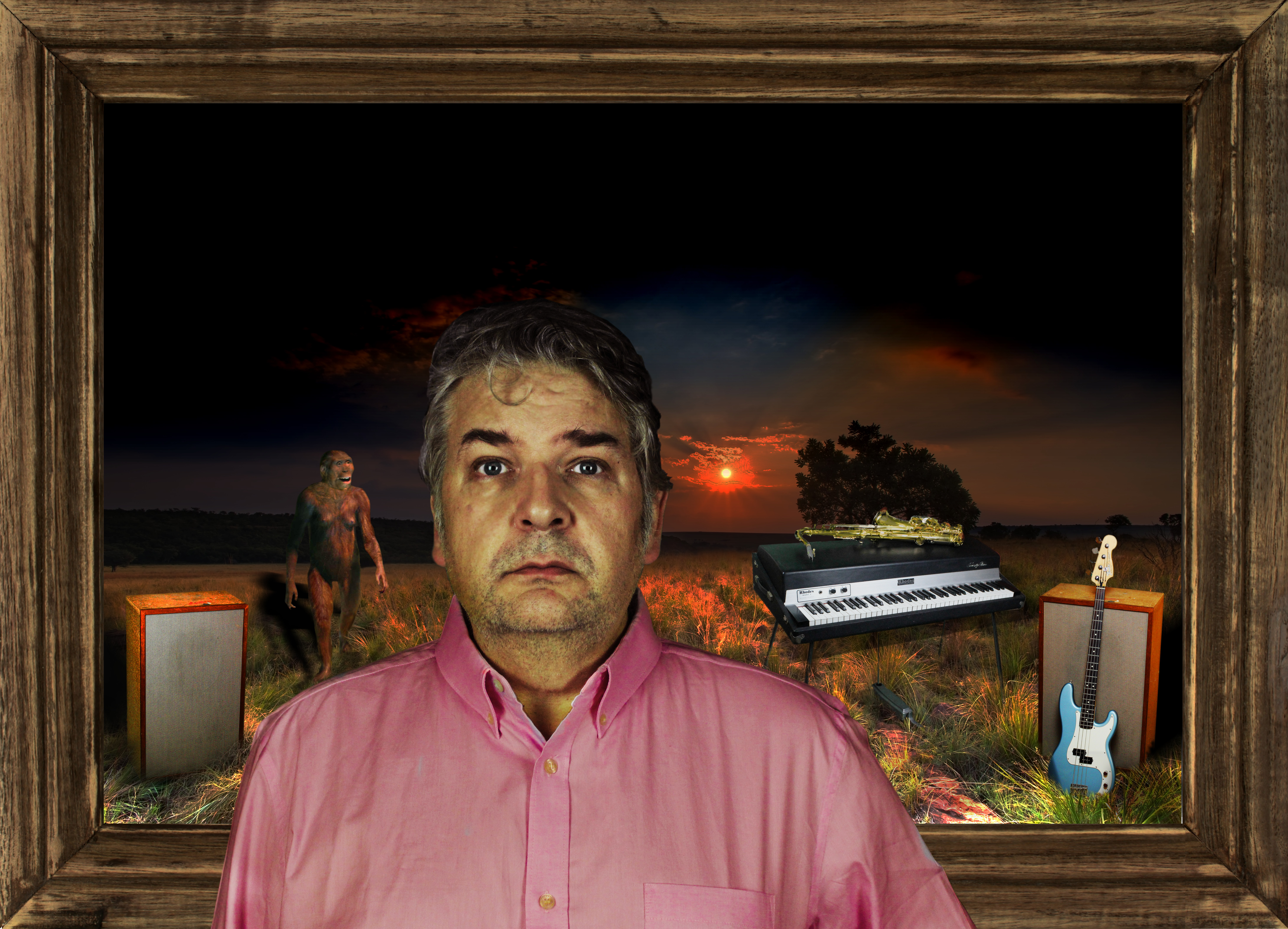
 I’ve been lucky enough to get the chance to write about artists with a social conscience that fit into the tradition of mid-’60s folkies by broadening the masses’ awareness of what’s going on in the world. Singer-songwriter (and founding member of the Brand New Heavies) Jim Wellman is no different, using his new album, Dawn to Dusk to bolster social issues. According to Wellman, “The album is social commentary but viewed through perspectives of human psychological evolution and analysis of mass communication and propaganda. The core of the work is the understanding that Man lives in a world of amazing technological development, but is still encumbered with medieval forms of government by representatives who serve mainly the interests of the elite.”
I’ve been lucky enough to get the chance to write about artists with a social conscience that fit into the tradition of mid-’60s folkies by broadening the masses’ awareness of what’s going on in the world. Singer-songwriter (and founding member of the Brand New Heavies) Jim Wellman is no different, using his new album, Dawn to Dusk to bolster social issues. According to Wellman, “The album is social commentary but viewed through perspectives of human psychological evolution and analysis of mass communication and propaganda. The core of the work is the understanding that Man lives in a world of amazing technological development, but is still encumbered with medieval forms of government by representatives who serve mainly the interests of the elite.”
We wanted to know more about what inspires Wellman (including how Citizen Kane apparently inspired this collection of songs), so we sent him five burning questions. Here’s what he said.
1. Your album is heavy on the social commentary. How did the events in Ukraine in 2014 inspire and inform your music and lyrics?
The events in Ukraine in 2014 showed that despite the disastrous Western interventions in Libya, Iraq, and scores of other destabilization campaigns undertaken by Western powers creating chaos and destruction worldwide, there was to be no letup in and in fact an escalation of the Brzezinski doctrine in trying to intimidate economic competitors of the West, (Russia and China ) by bringing chaos to their borders by directly supporting fascism in Ukraine in this case.
It was yet more evidence that foreign policy seems to exist primarily for the interests of the military-industrial complex at the expense of and misery for the vast majority of people in the targeted areas. Soon the west will have to face up to the inviability of their debt-based economies, and the oligarchy that is responsible for it will fall unless they can destroy their competition in wars and distract the people away from their incompetence. Ukraine showed that there was still no plan B, and that another world war of unprecedented destruction is a very real possibility with this “do or die” mentality of the failing oligarchy.
2. At that time, you never intended to make music again. Was there a singular moment (as opposed to an entire movement) that made you change your mind?
Yes there was, or rather the juxtaposition of two moments. The first was the BBC whitewashing coverage of the burning of the Trade Union Building in Odessa (containing anti-Maidan protestors), and the second was the BBC trailer using a well- known happy piece of music which was repeated every 30 minutes afterwards. It just seemed incongruous and made me think, “Where is today’s Marvin Gaye?” and although I don’t consider myself anywhere near that league of talent, the seed was sown In me that I had to do something musically to express my dissent. The first lyric I had was, “Tyranny came with a happy song today.”
3. There are some pretty complex themes in your album relating to the mass media, technology, and the government. What is it that you’re trying to communicate to your listeners exactly?
Firstly, as a message of dissent I am saying, “Not in my name!”
For all our advanced technology and exceptionalism, the last century has been the bloodiest and most cynical and environmentally damaging in human history in the five million years since our ancestors first walked upright. For nearly all that unimaginably long time , the success of our species was steered by individualism but moderated by social groups within communities. With civilization (only about 10,000 years ago) , the input of the vast majority of the people was superseded by the leadership of a select few though central rule. It brought security to those populations and the system has remained ever since. However, there are great problems and inefficiencies in that system cased by the ability of those in power to use their power for self preservation and personal advancement. With the advent of mass communications in the hands of only the powerful, the ability to manufacture consent through propaganda amplified those problems considerably. The advent of the internet allowed for the first time since civilization, the POSSIBILITY of the people to have their say, and have diverse sources of information not controlled by the oligarchy, to reintroduce the moderating effects of community on our leadership. I believe the effect on the control of the oligarchy has already been devastating, and we must expect and resist a backlash in attempts to neuter the moderating effect of diverse information and selection by the many. So I suppose in short with this album I am also ‘advocating citizenship’ as our only defense against the problems we face.
However, there are great problems and inefficiencies in that system caused by the ability of those in power to use their power for self-preservation and personal advancement. With the advent of mass communications in the hands of only the powerful, the ability to manufacture consent through propaganda amplified those problems considerably. The advent of the internet allowed for the first time since civilization, the possibility of the people to have their say, and have diverse sources of information not controlled by the oligarchy, to reintroduce the moderating effects of community on our leadership. I believe the effect on the control of the oligarchy has already been devastating, and we must expect and resist a backlash in attempts to neuter the moderating effect of diverse information and selection by the many. So I suppose in short with this album I am also ‘advocating citizenship’ as our only defense against the problems we face.
However, there are great problems and inefficiencies in that system cased by the ability of those in power to use their power for self-preservation and personal advancement. With the advent of mass communications in the hands of only the powerful, the ability to manufacture consent through propaganda amplified those problems considerably. The advent of the internet allowed for the first time since civilization, the possibility of the people to have their say, and have diverse sources of information not controlled by the oligarchy, to reintroduce the moderating effects of community on our leadership. I believe the effect on the control of the oligarchy has already been devastating, and we must expect and resist a backlash in attempts to neuter the moderating effect of diverse information and selection by the many. So I suppose in short with this album I am also “advocating citizenship” as our only defense against the problems we face.
4) Your video for “Probably Good” was inspired by Citizen Kane. Can you tell us a little about how that came about?
Citizen Kane is still considered to be the greatest film ever made by film critics. Not only because of its technical innovations to the medium, but because of the sheer guts (pun intended) of Orson Welles to use his unprecedented clout in his first film to attack the most powerful man in America, publishing magnate W.R. Hearst. Anyone who considers the best route to change has to pick a cause or target, and I think Welles nailed it in identifying the arrogance of an oligarch with great self-belief, and the dangers of propaganda in distorting the agenda away from the interests of the people. Welles’ film career paid dearly for having picked such a powerful adversary.
The track “Probably Good” is about how easily corruptible an individual is when devoid of the moderating effects of community and choosing to live for his own. Paying tribute to Welles’ achievement structurally, I used photographs and video of myself at various ages to try and portray the making of a fairly repulsive detached patriarchal oligarchy, living in a grandiose luxury house, and how he uses propaganda (symbolized by the mouthpiece in the video) also adding a pied-piper connotation (sax solo) by having everyone dance to his tune/values. The video was supposed to be satire but has also picked up detractors, some of whom seemingly mistaking the satire for how I wanted to project myself.
5. Do you think you’ll continue making music, or do you think you’ve said what you need to say and are finished again?
The main problem with independent music production for most people is the limited resources we have to spend on our projects. I have never made profit on any independent work, and have not in this case either (yet). We are excluded from the vast majority of music industry exposure/airplay dedicated to major label productions and are prime targets for piracy. There are more pirate sites offering free downloads of my album than the actual number of sales I have so far, and some of those sites have chalked up over 700 downloads. In this case, I am not so bothered by it because primarily for a work of dissent I wanted exposure more than profit.
Also the lyrical content of this album has come from a lifetime of interests in psychology, anthropology, propaganda, and politics, and I do feel I said everything I needed to say in a sort of interlocking thesis if you like. I think it would be some time before I could pull together this much source material again without repetition. Having said that I really enjoyed the creative process again after a 10-year break, and if there was to be a next time I think I would look at crowd funding for a public domain work instead.
Stream “Probably Good” below!





Comments